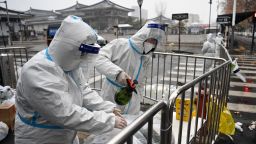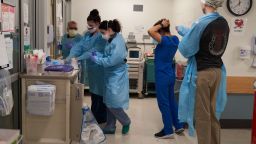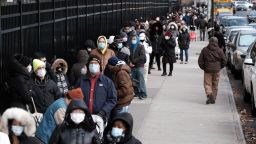Several European countries — such as France, the UK, Italy, and Portugal — are currently seeing a large increase in daily new cases, many even setting new records since the pandemic began as the Omicron variant continues to spread. Despite the rising trend in daily cases, those figures haven’t translated into more deaths and hospitalizations, particularly when compared to the same period a year ago.
France reported a record high of 179,807 new confirmed coronavirus cases in a 24-hour period on Tuesday, setting the highest number since the start of the pandemic, the French health authorities said.
The latest data shattered the previous record of 104,611 new daily cases, which was set on Saturday.
The increase in daily figures is a huge increment of 176,847 new cases when compared to last year’s figures, yet despite a rise in hospitalizations and ICU occupancy, France latest data is showing less deaths.
French authorities’ data shows that in the last 24 hours, France recorded 290 coronavirus related deaths, 484 people hospitalized and 83 people in ICU beds.
A year ago, the country recorded 363 deaths, 25 hospitalizations and 44 people under intensive care.
Meanwhile, the UK has also set a new daily record of Covid-19 cases with 129,471, according to British government data released Tuesday.
Elsewhere in Europe, Portugal has also recorded the highest number of new daily cases since the start of the pandemic, with a total of 17,172 new coronavirus cases, the Portuguese Health Ministry said on Tuesday.
The highest count of daily infections took place on Jan. 28, with 16,432 cases reported at the time.
Looking back at last year’s figures, the latest data shows a large increase of 15,079 new daily cases, however, despite the rise in cases, Portugal is showing a lower number on deaths, hospital admissions and ICU occupancy.
The data shows that currently, Portugal has 936 people hospitalized, with 152 of them in intensive care and 19 deaths, whereas a year ago Portugal was recording 2,967 hospitalizations, with 503 of them in ICU units and a total of 58 deaths.
Italy is seeing a similar situation, with the country also reporting their highest daily new cases since the start of the pandemic with 78,313 people infected in the last 24 hours, according to the country’s Health Ministry data.
The latest figures show that the trend of rising cases continues after the country reported recently new daily case records for three consecutive days.
Despite the rise in daily cases, Italy has recorded lower figures in hospitalizations and deaths when compared with data from a year ago.
On Dec. 28, 2020, Italy recorded 8,585 new infections, 445 Covid-19 related deaths and 2,565 ICU beds occupied, which reveals a significant contrast to the most recent numbers of 78,313 new infections, 202 deaths and 1,145 ICU occupancy.
Correction: An earlier version of this post incorrectly stated that France’s ICU occupancy and hospitalizations are down in comparison with last year. The country’s latest data shows only deaths are down in comparison.































